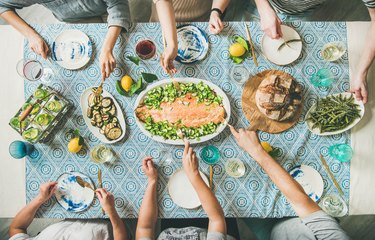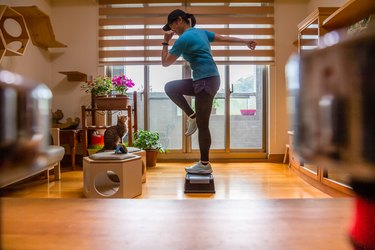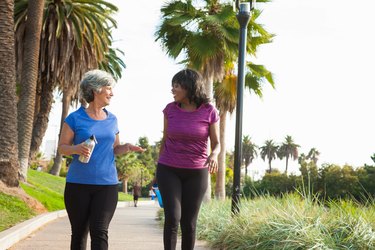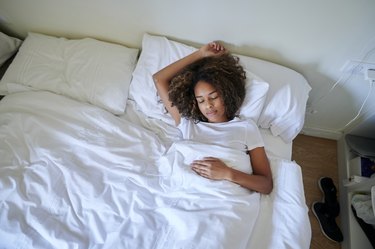
The hours between dinner and going to sleep tend to be a time to unwind and have fun. And if you play your cards right, they can also be a chance to support lower levels of inflammation and protect your long-term health.
"Inflammation can be influenced by many factors," says Thomas Bradley Raper, MD, a sleep medicine and critical care physician with Texas Health Presbyterian Hospital Dallas. "The things that we can control are diet, exercise and a mindset that we will make good choices with food and activity levels to maintain a healthy weight."
Video of the Day
Video of the Day
And you can have a say over all of those things in the evening. Here are eight research-backed nighttime habits to reduce inflammation (and check out these morning habits to fight inflammation, too).
1. Fill Half Your Dinner Plate With Vegetables
Having vegetables take up half the space on your plate is an easy rule of thumb that can help you get your fill each day (for adults, that should be 2 to 3 cups, per the Centers for Disease Control and Prevention). That's important, because greater vegetable intake has been tied to lower levels of inflammation markers in the blood, per a May 2022 Nutrients study.
Round out the other side of your plate with foods like whole grains, healthy fats like olive oil or avocado and lean proteins like beans, seafood or poultry.
Mediterranean-style diets rich in these picks have been shown to improve levels of pre-existing inflammation, Dr. Raper points out.
2. Take a Post-Dinner Walk
Head out for a stroll after you eat. Regular exercise in general can help combat inflammation and lower disease risk, and you'll reap additional benefits when you get moving post-meal.
"Walking after dinner can help stabilize blood sugar, which in turn can reduce levels of inflammation," says Dr. Raper.
It's a good idea to aim for 30 minutes of moderate physical activity most days of the week, per the Physical Activity Guidelines for Americans. But even a two- to five-minute walk around the block can offer blood sugar benefits, found a February 2022 Sports Medicine analysis.
3. Reconnect With a Loved One or Friend
Invite someone to join you on your walk or give someone a call you haven't caught up with in a while. Maintaining healthy social ties makes it easier to cope with stress, according to a September 2018 review in the International Journal of Psychophysiology.
That can be helpful when it comes to keeping inflammation levels low. "High levels of the stress hormone cortisol are associated with chronic stress," Dr. Raper explains. "Anything to relieve stress will improve cortisol, and therefore improve the inflammatory response."
4. Watch Something Funny
A dose of laughter can help you relax and feel less tense too.
In one March 2021 study in Scientific Reports, participants who watched a funny movie had lower levels of cortisol in their saliva while performing a stressful task compared to those who watched a neutral movie. Netflix comedy special, anyone?
5. Snack on Some Popcorn, Then Close Up the Kitchen
Large portions of fatty, sweet or salty treats tend to be the go-to for most people at night. (Hello, chips and ice cream!) Problem is, highly processed snacks can spike your blood sugar and raise levels of inflammation.
Eating within two to three hours of bedtime also isn't ideal, because it can disrupt the body's sleep-wake cycle and also increase inflammation, explains David Cutler, MD, a family medicine physician at Providence Saint John's Health Center in Santa Monica, California.
If you're in the mood to nosh, try a bowl of air-popped popcorn (and check out these tips to get the flavor to stick). It's a whole grain (really!), which have been found to lower levels of inflammatory markers in the blood, per a January 2022 Nutrients review.
Enjoy it at least a few hours before bedtime, then turn out the lights in the kitchen to remind yourself that you're done eating until breakfast.
6. Charge Your Phone Outside Your Bedroom
Bringing your phone into your room ups the odds you'll be scrolling close to (or well past) bedtime. And just like eating late at night can disrupt your sleep-wake cycle and promote inflammation, so too can being exposed to the blue light from your phone in the hours leading up to bed, Dr. Cutler points out.
Your move: Park your device at a dedicated charging station before heading into your room for the night. As a bonus, not having it on your nightstand means you won't reach for it the minute you wake up in the morning either.
7. Do a Quiet Activity
Relaxing activities like stretching, journaling, meditating or even practicing deep breathing help fight stress, plus, they have the added benefit of helping your body unwind at night so you have an easier time nodding off, Dr. Cutler says.
Try sticking with the same activity every night. Within a couple of weeks, your body will start to associate it with getting ready for sleep, potentially helping you doze off even faster, according to Johns Hopkins Medicine.
8. Go to Bed on Time
Sure, you might be able to function on five or six hours. But seven or more hours of sleep is what's needed to feel your best, both now and long-term, according to the Mayo Clinic.
"Sleep is a critical process that allows the body to rest, recover and repair itself," Dr. Cutler says. "When we don't get enough sleep, it can trigger a cascade of physiological changes that can lead to inflammation."
So pick a bedtime that'll help you catch the zzzs you need, and stick to it.
- Sports Medicine: "The Acute Effects of Interrupting Prolonged Sitting Time in Adults with Standing and Light-Intensity Walking on Biomarkers of Cardiometabolic Health in Adults: A Systematic Review and Meta-analysis"
- International Journal of Psychophysiology: "Social aggravation: Understanding the complex role of social relationships on stress and health-relevant physiology"
- Scientific Reports: "A short humorous intervention protects against subsequent psychological stress and attenuates cortisol levels without affecting attention"
- Nutrients: "Whole Grain Consumption and Inflammatory Markers: A Systematic Literature Review of Randomized Control Trials"
- Johns Hopkins Medicine: "Sleepless Nights? Try Stress Relief Techniques"
- Mayo Clinic: "How many hours of sleep are enough for good health?"
- Centers for Disease Control and Prevention: "Only 1 in 10 Adults Get Enough Fruits or Vegetables"
- Physical Activity Guidelines for Americans, 2nd Edition
Is this an emergency? If you are experiencing serious medical symptoms, please see the National Library of Medicine’s list of signs you need emergency medical attention or call 911.








